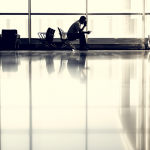The illusion of safety on American soil was shattered by 9/11. Collapsing along with the twin towers was the assumption that our businesses, homes, families, and all our assets were safe from harm. Personal and national security became priorities for government and industry. Terrorism does that. It slaps the slumber out of our postmodern ambivalence by reminding us of an unpredictable future. And as a father of four, I was grateful for the wake up call.
But safety gets carried away. For years I’ve watched neighbors drive their kids 200 feet to the end of our street to meet the bus. And we live in a cul de sac.
Years ago, the world was rocked by a recession fueled by the overreaching ambitions of entire sectors of the economy. The response was predictable: more hastily passed regulations aimed at limiting risk and protecting our supposedly secure and stable way of life.
An Aversion to Risk
In an increasingly fragile world, postmodernity develops an understandable aversion to risk. We make self-protection our passion and have exit strategies from anything that threatens what we need or want.
I’m all for minimizing risk and taking responsible steps for protecting people and assets. But postmodernity leads us to believe we must tightly customize and control our safety. Sociologist Anthony Giddens observed, “The measurement and management of risk is more central to our culture than ever before, as the unavoidable cost of navigating a world that we feel that we can actively shape.”; Postmodernity loves control and that makes “risk” very unpopular.
But here’s the thing: When risk is avoided, ambition grinds to a halt. You can’t fear one and expect the other to flourish. If we want to stoke ambition—I’m talking about aspirations for the glory of God—we will have to come to terms with risk.
In Hebrews 11, Abraham is commended because, “He went out, not knowing where he was going” (Heb. 11:8). Abraham’s ambition to obey God led him down a puzzling path. He went forward, not foreseeing the outcome. Ambition for God meant going, not knowing. And between the hills of “going” and “not knowing” lies the valley of risk.
The Christian life is a kind of mysterious suspense; we act on godly ambition without knowing the result. Like Abraham, we’re going out, not knowing where we are going. It certainly creates a lot of adventure. But it also raises an age-old question, “why?”
A Daily Reminder
Risks and uncertainty are daily reminders of how much greater God is than we are. Think about it: God is all-powerful, controlling all things. God is right now spinning the entire universe like a basketball on his big finger, and at the same time controlling the amount of times you blink as you’re reading this paragraph. Pretty remarkable, huh.
We’re far less impressive. Risk happens because we’re not omniscient or omnipotent. We’re human, we’re finite, our knowledge has limits.
We take risks, God does not.
A Deeper Experience
Risk always leads us to experience God in a deeper way. Risk rescues us from misplaced security by anchoring us in the eternal. Have you noticed how your desperation for God increases with the uncertainty in your life? The new job, the new child, that new ministry—all of a sudden we’re desperate for God. God delights to put us in this position because it postures us to depend on him and to exercise faith toward him.
It’s how he rescues us from the misplaced security that is such a consuming distraction in the postmodern world.












